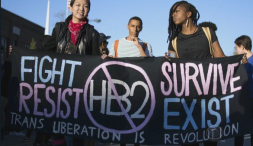Trans narratives are hot.
Across the globe, media makers are turning to the transgender community for fodder for films, photo exhibits, stage plays, magazine articles, etc. In fact, if you aren’t talking about trans people, then you are missing out on what is an incredibly powerful media moment where our lives have become the catalyst for mainstream discussions of gender, sexuality, and even race.
Riding the wave of this trans trend is the new Netflix series, Orange is The New Black. Based on the book of the same name, the show tells the story of Piper Kerman and the colorful inmates she meets during her one year sentence at a women’s prison. Written and directed by women with a majority women cast, OITNB is breaking new ground in a number of ways but is mainly doing so by ushering in a new and powerful representation of black trans identity through the character of Sophia Burset.

Although OITNB treads the line of racial stereotype, the show is redeemed by the ways in which it depicts female sexuality. For the most part, all of the women in the prison are represented as having control of their sexuality despite their reality of incarceration. Whether they are sneaking into chapels to fuck, risking solitary confinement for a mind shattering screwdriver induced orgasm, or rejecting the advances of lovestruck but dangerous cellmates, the women are consistently shown with some semblance of sexual agency. The character of Sophia is no different.
For instance, in a predictable “trans” moment from the series, Sophia is advised to offer sexual favors to a sexually abusive guard in return for him sneaking in her life saving hormones. Though she briefly considers the exchange in a well written moment of desperation that toys with audience expectations, Sophia ultimately rejects the offer to seek out alternative means of trans survival. This powerful plot twist is extremely notable in a climate that assumes that trans women of color are innately prone to sex work as the only avenue of survival.
Sophia’s choice to rely on strategy and intellect instead of her body to get what she needs, is not the limit of her sexual agency. As a trans woman who is married to a cisgender woman, the portrayal of their relationship explodes overarching myths that have positioned trans women of color as sexually undesirable outside of pornographic imagery. At the same time, their union also calls attention to the nuances of marriage equality in relation to trans individuals who are victims of the prison industrial complex–an issue that has yet to gain traction in the marriage equality debate.
Perhaps the most compelling act that the presence of Sophia’s wife performs, is a challenge to the widespread notion that black people are more homophobic and transphobic than any other racial group. While we know this isn’t true, it is unfortunately rare to see mainstream images of black queerness based on acceptance and tolerance. Even the black inmates housed with Sophia, fully recognize and respect her as a woman and are shown supporting her hair salon or voting for her to become block president. This might seem as a minor plot point to some but to witness black cis women and trans women support one another is indeed a radical representation of the possibilities of black solidarity. And it is amazing.
Carrying the burden of representation as being the first show to include a black transgender actor as a cast lead does not make OITNB cutting edge. No.
What makes it work–what makes it memorable–what makes it powerful, is that, it offers an image of black trans womanhood that is complex, messy, imperfect and, above all, human. Hopefully, work by allies who are fascinated by the trans narrative, will follow suit.

